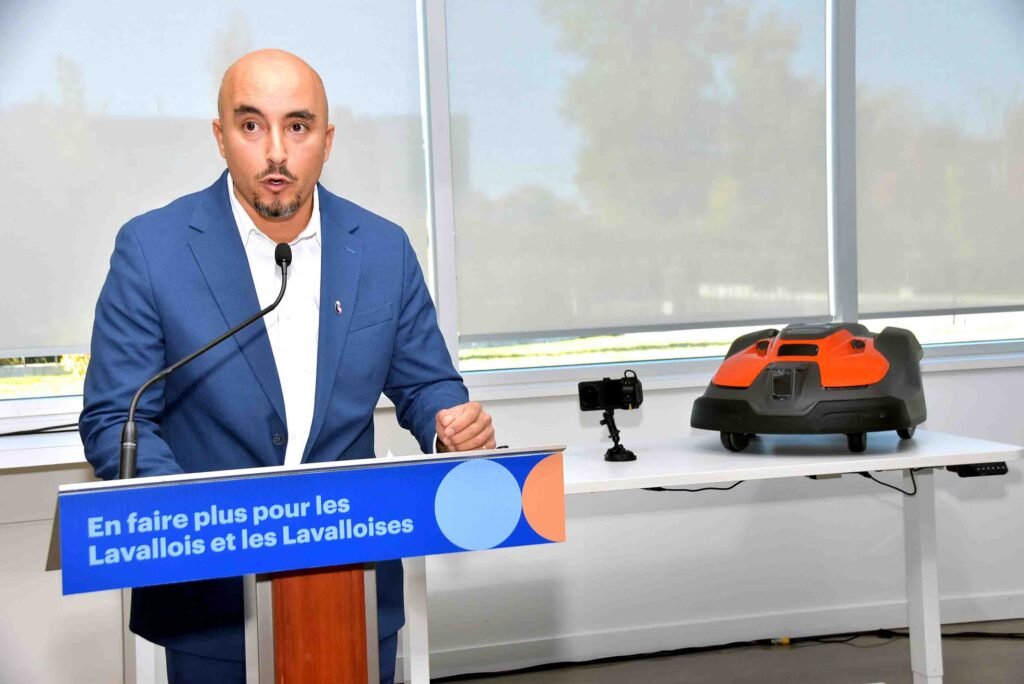AI coming to services ranging from citizen relations to public works
The City of Laval says it has now become a leader among Quebec’s municipalities for efficiency and transparency with a new vision to maximize the convenience and speed of its services for residents.
‘Growing needs’
“Like many other municipalities, Laval is faced with a situation involving growing needs but limited resources,” Mayor Stéphane Boyer said during a press conference last week to announce new technologies and systems the city will be using to help meet its goals.

“That is why for the past two years, we have been working towards reforming the culture of our organization,” he added.
“I am among those who believe that an efficient municipal administration is a guarantee of greater quality for services to residents, for raising of working conditions and for a true capacity to deliver expected projects to citizens within a reasonable time at reasonable cost.”
‘A responsibility,’ says Boyer
“However, more than just believing, I am also of the opinion that we are talking about a responsibility, a necessity even, which is to make sure that each dollar paid by taxpayers goes the furthest possible,” said Boyer. “And why shouldn’t we pursue the goal of being the best city in Quebec in this matter.”
Beginning in November, according to city officials, Laval will be upgrading the quality of its response time with residents who contact the city’s client relations agents by phone at 3-1-1 or by other means.
The city says that from now on, and in keeping with a commitment to transparency, Laval residents will be told how many days have elapsed between the time a resident makes a request and when it finally is resolved.
Improving transparency
“For the sake of transparency and commitment, the delays have been defined in order to guarantee an adequate, realistic and satisfactory response for each request sent to the city,” said Benoît Collette, the City of Laval’s director-general. “With clear, measurable and shared standards, the city will offer better visibility as regards the length of time for processing requests.”
According to the city, information regarding delays in processing requests will be made available for all phone contacts, as well as in person at the city’s multiservice client offices, and online through the “Mon Dossier” web site. The city says that performance indicators will be in place to make sure the results meet customer satisfaction targets.
The city says that Artificial Intelligence (AI) will be playing a more prominent role in the near future in plans to increase the municipality’s overall efficiency. For example, beginning this fall the public works department is using mobile pothole detection units to seek out and identify breaks or imperfections on the pavement of Laval’s many streets and roadways before they deteriorate further.
Bill-paying efficiency
AI has also been deployed since March this year to increase the efficiency of the City of Laval’s bill-paying abilities. The city currently does business with some 10,000 providers of services and products and needs to process more than 120,000 payment invoices annually. Laval has started using an automation tool with AI built in.

The goal is to minimize the amount of processing time and related costs, to pay providers faster and to simplify procedures as much as possible for city employees. The city’s 3-1-1 call centre, which has come in for a fair degree of criticism by users over the years, is also about to be improved through the addition of Artificial Intelligence.
The city says that AI, supplemented by cloud computing technology, will provide call centre employees with text-based readouts, such as transcripts of calls and other information, making the job easier for personnel and the overall customer service experience more pleasant for Laval residents.
AI-powered lawn mowers
The City of Laval’s public works department, normally a labour-intensive environment, is also starting to be taken over by Artificial Intelligence. As part of a pilot project, the city has started to purchase self-driving, electrically-powered lawn mowers as “an eco-responsible, practical, silent and safe solution for the management” of two green spaces, the city says in a press release.
The city foresees a 30 per cent savings from the move, coming from lower energy, maintenance and repair costs, as well as from fewer outsourced contracts to landscaping firms which did that work for decades.



